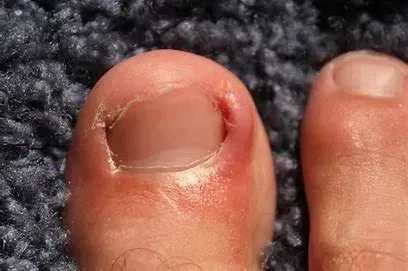
Ingrown Toenails
An ingrown toenail is a common and often painful condition that happens when the edge of your toenail grows into the surrounding skin. While it might seem like a minor issue, it can lead to an infection and significant discomfort if left untreated. Let's break down what you need to know about ingrown toenails, how a footcare nurse can help, and when it's time to seek professional advice.
What Exactly is an Ingrown Toenail?
Imagine your toenail as a shield protecting the sensitive skin underneath. Normally, the nail grows straight out. However, with an ingrown toenail, one or both corners or sides of the nail dig into the soft flesh of your toe. This can happen to any toe, but it's most common on the big toe.
What are the Signs and Symptoms to Watch Out For?
Recognizing the early signs of an ingrown toenail can help you address the issue before it becomes more serious. Here are some common symptoms to look out for:
Pain and Tenderness: This is usually the first sign. You might feel a throbbing or sharp pain along the side of your toenail.
Redness: The skin around the affected nail might become red and inflamed.
Swelling: The area could also become puffy or swollen.
Warmth: The skin around the ingrown nail might feel warm to the touch.
Pus or Drainage: If the ingrown toenail becomes infected, you might notice yellowish or whitish pus draining from the area.
When should you seek professional help?
While minor ingrown toenails might resolve with careful at-home care, it's important to know when to seek professional help. You should consider seeing a professional healthcare provider if you experience any of the following:
Severe Pain: If the pain is intense and doesn't improve with home care.
Signs of Infection: Redness spreading beyond the immediate nail area, significant swelling, warmth, or pus.
Underlying Medical Conditions: If you have diabetes, poor circulation, or a weakened immune system, it's crucial to seek professional care promptly as infections can become more serious.
Recurrent Ingrown Toenails: If you frequently experience ingrown toenails, a professional can help identify the underlying cause and suggest preventative measures.
Uncertainty About Home Care: If you're unsure about how to properly care for your ingrown toenail at home.
How Does a Footcare Nurse Treat Ingrown Toenails?
Footcare nurses are trained healthcare professionals who specialize in the care of feet and lower limbs. They play a vital role in treating ingrown toenails and preventing future occurrences. Here's how a footcare nurse might address an ingrown toenail:
Assessment: The footcare nurse will carefully examine your toe and the ingrown nail to determine the severity of the issue and identify any signs of infection.
Gentle Cleaning: They will gently clean the area around the ingrown nail to remove any debris or bacteria.
Lifting the Nail: Using specialized instruments, the nurse can carefully lift the edge of the ingrown nail that is digging into the skin.
Trimming the Nail: The footcare nurse can properly trim the toenail straight across to help prevent future ingrowth.
Prescription: If there is an infection, the nurse will recommend that you go to see your family doctor for oral antibiotics if the infection is more severe.
Education and Prevention: A crucial part of the footcare nurse's role is to educate you on proper foot care techniques, including how to trim your nails correctly and choose appropriate footwear to prevent future ingrown toenails.
Minor Surgical Procedures: In cases of recurring or severe ingrown toenails, the footcare nurse will refer you to see a Podiatrist.
In Conclusion:
Ingrown toenails can be a real pain, but understanding the signs and knowing when to seek help from a professional healthcare provider, this can make a big difference. Remember to pay attention to your feet, practice proper nail trimming techniques (straight across!), and don't hesitate to seek professional care if you notice any signs of an ingrown toenail or infection. Your feet will thank you for it!